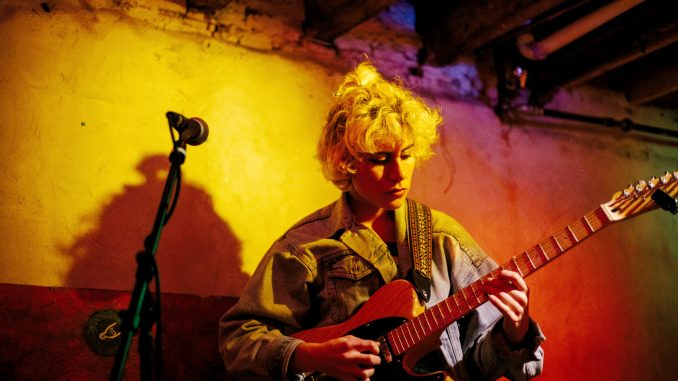
While recording one night, Jacob Rosati, producer for Philadelphia band Howlish, wanted to re-record a guitar solo to make it sound like “wriggling worms.”
The solo, which made it onto the last track of the band’s LP, “0uter,” parallels a sub-genre of music that celebrates bizarre and off-kilter sounds: psychedelic rock, a movement which dominated the late 1960s and ‘70s and is seeing a resurgence in Philadelphia’s underground music community.
Psychedelia emerged out of the folk rock and blues rock movements of the mid-1960s in the United States and Britain, drawing from influences like folk, soul and rock to create a diverse genre that captured the younger generation. Shaped by groups like Pink Floyd, Jimi Hendrix and the Beach Boys, psychedelic rock reached a peak in 1969 with the Woodstock Music and Art Festival. The seven-day long music festival is widely regarded as one of the most pivotal moments in American rock history.
Justin Bennie, keyboardist and vocalist for Philly psychedelic band Motherer, said the late 1960s were “the golden era of psychedelic rock.”
“[Motherer is] definitely more influenced by interesting songwriting than textural craziness … the idea of interesting changes and things that come more from the Beatle-esque tradition,” Bennie added.
A second wave in psychedelic rock and folk came in the 1990s with the popularity of The Elephant 6 Recording Company, which produced artists like Of Montreal, The Apples in Stereo and Neutral Milk Hotel, which all shared an admiration for the sound of ‘60s psychedelia and modernized traditional folk and rock sounds. Some popular artists, like Animal Collective, took an experimental approach, combining psychedelic rock sounds with other genres, while more psychedelic pop artists like Tame Impala directly emulated the sound of the ‘60s.
“We all appreciate what Tame Impala is doing with psychedelic pop,” said Jacob Folk, bassist and vocalist for Motherer. “They’re making psychedelic relevant again.”
While Motherer draws influence from the psychedelic rock of the 1960s, Howlish looks to the neo-psychedelic movement of the ‘90s, incorporating a variety of sounds inspired by groups like No Doubt, Warpaint and The Antlers.

“We usually call it ambient rock because we want to keep in mind that it’s OK to not be playing a trillion notes, it’s OK to leave space between notes as long as there’s that sonic texture,” said Howlish vocalist Mark Watter.
“Everyone likes really different stuff,” he added. “I think the drums play a big part in tying the various influences together … I think we’re lucky that we don’t have to sound like any certain genre.”
The freedom within the psychedelic genre serves as an appeal to younger artists and a reason behind its revival today. Philadelphia artists like The War on Drugs and Kurt Vile gained mainstream success with their signature sounds derived from the neo-psychedelic movement, which encourages experimentation alongside today’s advanced technology.
“The Internet can now move music around in such a way and I think it’s the freedom of not being constrained to really expensive studio time or feeling like you have to use the best equipment all the time to get the best sounds,” Watter said. “Even with free software, if you spend enough time on it, you can make it sound like studio quality … you can make these sounds with anything now.”
“Psychedelic rock has always been about experimenting in the studio and using studio techniques,” Bennie added. “And that, due to technology now, is more affordable than ever and now kids our age can do that realistically.”
To Howlish, Motherer and many other psychedelic inspired groups, it comes as no surprise that Philadelphia has become increasingly involved in the growing psychedelic movement.
“Philly is a great town to be doing this kind of thing in,” Watter said. “The music scene is growing rapidly … and Fishtown is exploding with talent and vibrance and excitement, everyone is always outside doing exciting things and it’s awesome that that is what Philly is.”
However, Folk said, it’s taken more time for the community to support the psychedelic movement, noting that finding other psychedelic bands to book shows with can be difficult at first. The size of the underground movement is made up for by the freedom and supportive environment that psychedelic rock has created in Philly.
“It’s the kind of music that focuses on being a little weird while completely normal at the same time, he said. “The psychedelic aspect frees you up to do whatever you want.”
“I think psychedelic rock kind of sets that template, the idea to be able to do something weird and still have people get down to it,” Bennie added.
“[Philly] isn’t overflowing with psychedelic bands but it’s growing and recently I’ve been seeing more bands that are more like our sound,” Folk said. “We’re building this little psychedelic community.”
Emily Thomas can be reached at emily.ralsten.thomas@temple.edu.


Be the first to comment